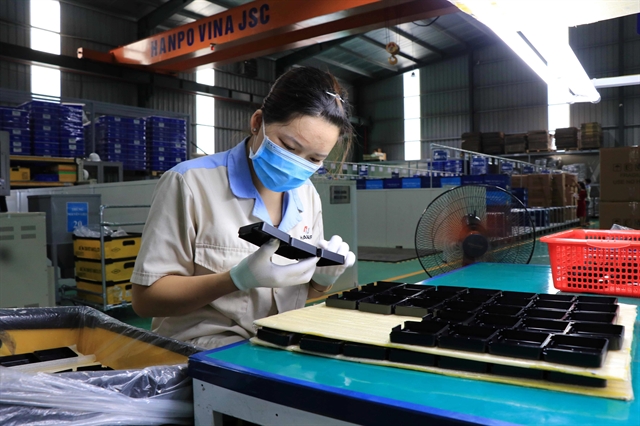 Economy
Economy

 |
| A supporting enterprise in Bắc Ninh Province. Việt Nam needs legal system to develop key industrial sectors, including the support industry. —VNA/VNS Photo |
HÀ NỘI — Việt Nam needs a legal corridor to clearly define development for key industries in the process of industrialisation, according to the Ministry of Industry and Trade (MoIT).
The current legal system does not have specific regulations on identifying key industries as well as specific policies to promote the development of these industries.
It also lacks of specific regulations on improving competitiveness for key industries.
In addition, the existing laws do not have specific regulations on mechanisms to coordinate policies in a roadmap towards sustainable development in industrial production, especially key industrial sectors that are suitable to the needs of the economy, the trend of developing circular economic models, green growth and sustainable production.
According to the ministry, market support solutions have not been paid due attention in the process of developing industrial policies; as well as mechanisms and policies for application, transfer, improvement and innovation of production technology in industrial sectors.
The competitiveness of enterprises - especially enterprises in key industries - is still very limited. Meanwhile, labour and management qualifications in domestic enterprises are still limited, leading to low labour productivity in industrial sectors, greatly affecting competitiveness.
Another limitation is the business environment. According to MoIT, this has been improved recently, but there are still many shortcomings, affecting the stability in the development of key industries that require stable policies, and long-term development strategies.
The export growth of the industrial sector still depends on FDI enterprises.
In the first two months this year, the export value for processing industry's products reached US$52.45 billion, accounting for 88.4 per cent of the country's export turnover.
However, the foreign investment sector accounted for a significant 72.8 per cent of more than $59 billion in total export turnover in the first two months. In contrast, the domestic economic sector held only 27.2 per cent of that amount.
Experts have pointed out that said the manufacturing industries in Việt Nam are primarily focused on processing for export. The country lacks large manufacturing enterprises in key industrial sectors, with the majority being small and medium sized enterprises. This situation makes it very challenging for Việt Nam to participate effectively in the global supply chain.
Deputy Prime Minister Trần Hồng Hà has emphasised the role of industry in the country's economic development to realise the goal of Resolution 29/NQ-TW on the acceleration of the national industrialisation and modernisation to 2030 with a vision to 2045.
The domestic industrial sector now is mainly dependent on FDI enterprises. There are many issues during developing key and priority industries stated in Resolution 29/NQ-TW, such as information technology, mechanical manufacturing, supporting industry, green energy industry, and new materials, according to the Deputy PM. The industry and trade sector needs to have plans and proposals to the Government to develop those fields.
Industry experts have emphasised that manufacturing is the centre of the industrial development process, and supporting industries are the nucleus of manufacturing industry. To realise the goal of industrialisation and modernisation, Việt Nam must attach importance to the development of foundation and key industries.
Việt Nam is developing a series of infrastructure projects in the transportation sector, such as roads, railways, airways and maritime, or in the energy sector, such as wind power, solar power and LNG gas power. Those projects must import almost equipment for development.
Associate Professor, Dr. Nguyễn Chỉ Sáng, chairman of the Vietnam Association of Mechanical Enterprises (VAMI), said Việt Nam lacks completed mechanical products, and large mechanical products for projects of wind power, high-speed railways, urban railways and medical equipment, because there is no planning, no strategy, no roadmap for domestic enterprises to manufacture those devices.
About $400 billion of mechanical equipment for the transportation, energy and healthcare sectors is a great opportunity for Việt Nam's mechanical and supporting industries to develop, according to Sáng.
Phạm Văn Tài, general director of Trường Hải Auto Corporation (Thaco), has recommended that for the mechanical industry and supporting industries, MoIT should complete soon and submit to the Government and the National Standing Committee the Key Industrial Law to get approval this year, creating a legal corridor that attracts businesses to put investment in developing industrial products.
The ministry should also request the Government to have policies on supporting and minimising risks for leading enterprises during cooperating domestic small and medium-sized enterprises in developing the mechanical and supporting industries. — VNS




